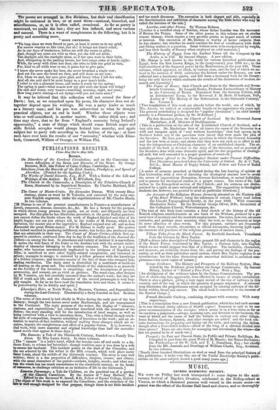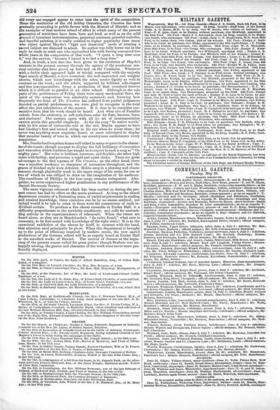MU SIC.
SACRED HARMONIC SOCIETY.
WE were on Friday last week transported ill some degree to the anni- versary festival of Haydn's Creation, celebrated in the Riding-school it Vienna, at which a thousand persons well versed in the music assist—so potent was the effect of the Exeter Hall band and chorus, and so thoroughly'
did every one engaged appear to enter into the spirit of the composition. Saw the institution of the old Ashley Oratorios, the Creation has been gradually proceeding in public favour with the Messiah of Handel; and as Ike exemplar of that modern school of effect in which many of the present generation of musicians have been born and bred, as well as on the solid ground of luxuriant instrumentation, perpetual contrasts, graceful melodies, and fanciful painting, it is really entitled to higher popularity than many who object against Ilaydn's "light and theatrical" mode of treating a sacred subject are disposed to admit. Its author was fully borne out in the reply he made to some one who reproached him with having consumed two whole years in the composition of that work. "I spent a long time over it," was the answer, "because I intend it to last a long time."
And, in truth, a new date has been given to the existence of Haydn's oratorio in the present century through the agency of the ponderous mu- sical societies that have grown up here and on the Continent. Whatever with a feeble choir appeared light or trivial, compared with the majestic fugal march of Handel, is here corrected; the well-instructed and weighty chorus, which now interchange with the solos, confer dignity as well as contrast on the work; and the whole, supported by brilliant solo-singers and fine instrumentalists forms a production of that sustained interest which it is difficult to parallel in an older school. Although in the solo parts of the performance of Friday there were many mechanical flaws, the spirit of the composition was admirably sustained; and, knowing how frequently the fame of The Creation has suffered from partial judgments founded on partial performances, we were glad to recognize in the total effect the just calculations of the master. It is thus in its complete con- secutive form that his work should be heard. And what airs of Paradise exhale from the orchestra, in soft melodious solos for flute, bassoon, horn, and elarionet! The modern opera with all its art of instrumentation cannot attain this graceful simplicity. As for the song "In native worth," with its few notes of violoncello solo at the end, Haydn appears to have had Lindley's first and second string in his eye when he wrote them; for never was anything more exquisite heard, or more calculated to display that peculiar beauty of tone in which our countryman outdistances every competitor.
Mrs. Sunderland is a prima donna well suited in many respects to the charac- ter of the music; though unequal to display the full brilliancy of conception and execution which tradition has taught us to expect in such a song as " On mighty pens." Her voice is brilliant, sonorous, and flexible; she takes high notes with facility, and possesses a rapid and equal shake. These are great advantages to the first soprano of The Creation: on the other hand, there was a manifest tendency to sharpness of intonation throughout, and the graces of finished style were deficient. Hobbs sang in a pleasing and chaste manner, though physically weak in the upper range of his notes, for one or two of which he was obliged to draw on the imagination of his audience. The excellence of Phillips in the bass songs remains unimpaired. Alto- gether, we never experienced higher gratification in any performance of the Sacred Harmonic Society.
The more vigorous rehearsal which has been carried on during the pre- sent season has had its effect on the music produced. As long as the choral department consists of a fluctuating mass, of varied acquirements in reading and musical knowledge, these exercises can be by no means omitted; nor indeed wouldit be safe to relax in them were the competency of each in- dividual certain. To produce a fine choral ensemble at Exeter Hall, is a difficulty proportionate to the unwieldy machinery, and calls for unremit- ting activity in the superintendence of rehearsals. When the voices are heard alone, as they are in Mendelssohn's "In exitu Israel," what care is necessary, to be fore-armed with knowledge Of the right notes! It is to the occasional exhibition of the chorus by itself, in contrast with the band, that attention need principally be given. When this department is brought up to the point of efficiency required by modern music, the new sacred productions of the German school will be as eagerly heard at Exeter Hall as the standard works of HandeL The revival of Samson at the begin- ning of the present season called for great praise: though Braham was un- happily missing, the genius and character of the work were never more pro- foundly displayed.











































 Previous page
Previous page